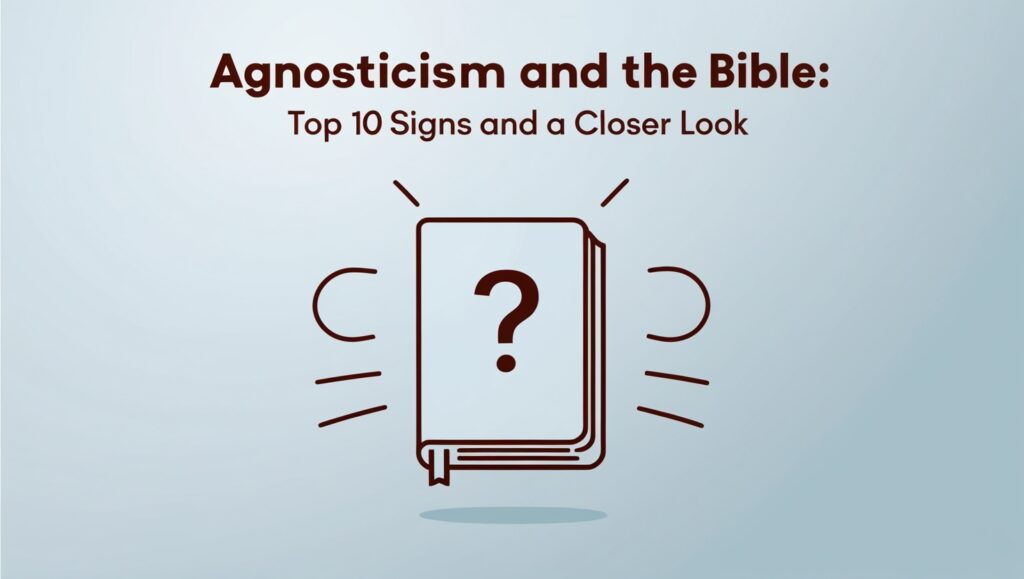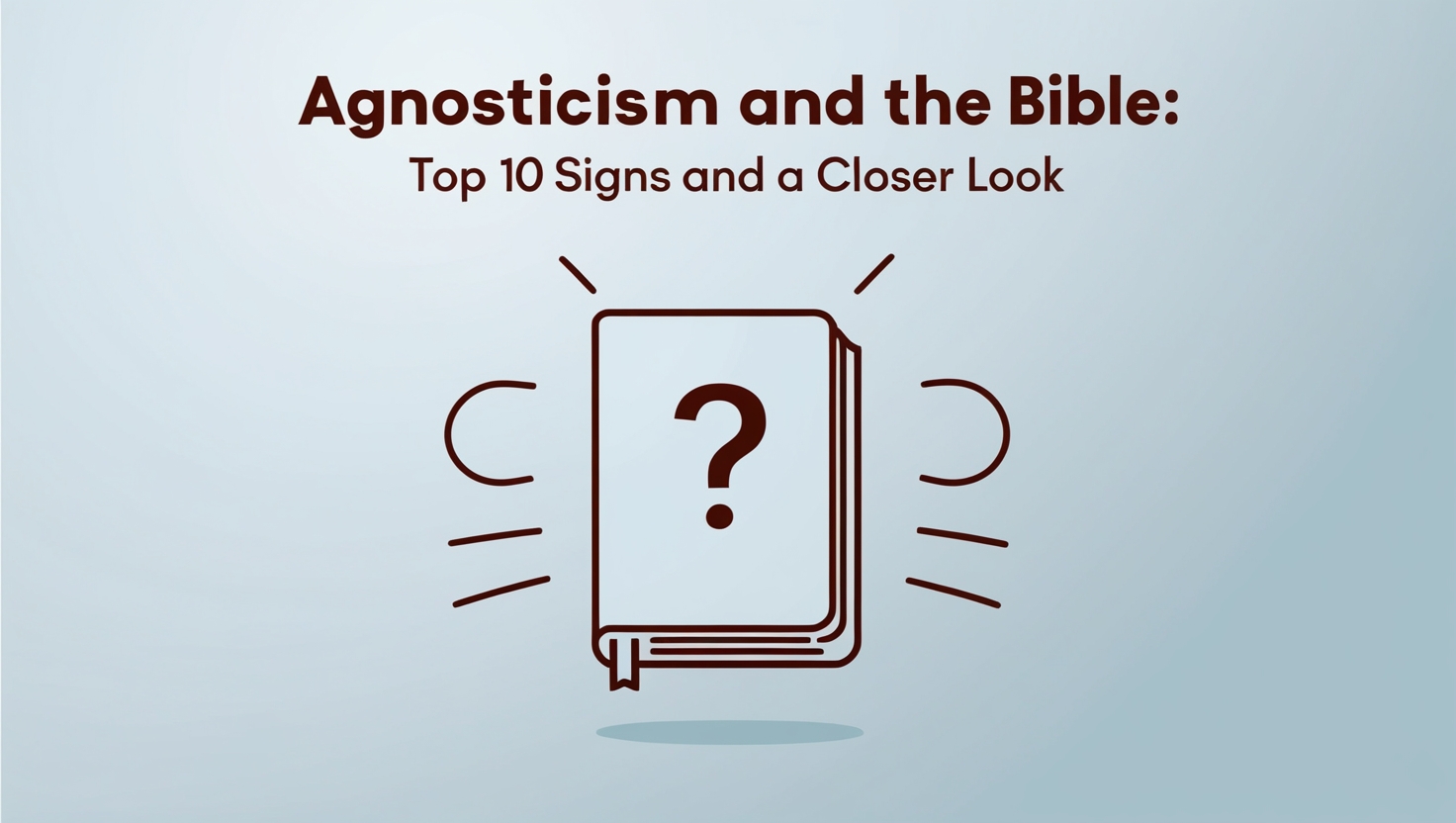Agnosticism and the Bible have for some time been subjects of interest and discussion, each holding an extraordinary spot in the domain of strict and philosophical talk. As people explore the authentic intricacies, suspicion, and translation, understanding the crossing point of agnosticism with the scriptural text turns out to be progressively huge.

In this investigation, we dive into the quintessence of agnosticism, look at its authentic setting, and analyze its vital fundamentals corresponding to the Bible. By examining the points of view, difficulties, and compromises that emerge when agnosticism meets scriptural understanding, we expect to reveal insight into the nuanced connection between these apparently unique domains of thought.
Prologue to Agnosticism and the Bible
In this article, we dive into the captivating crossing point of agnosticism and the Bible. While agnosticism is a philosophical position that recognizes the impediments of human information, the Bible is a focal strict text with significant ramifications for devotees and cynics the same.
Characterizing Agnosticism
Agnosticism, frequently misconstrued as wall sitting, is the unassuming acknowledgment that authoritative information about the presence of God or the heavenly is outside our ability to comprehend. It resembles shrugging your shoulders and saying, “I don’t have any idea, and that is completely fine.”
Outline of the Bible
On the opposite side of the ring, we have the Bible – an assortment of old texts worshipped by Christians, Jews, and Muslims. It recounts accounts of creation, ethical quality, and reclamation, however its understanding is pretty much as different as the shades of a rainbow.
The Authentic Setting of Agnosticism
To comprehend agnosticism’s starting points, we should bounce in our time machine and investigate the scholarly scene of the nineteenth 100 years, where suspicion and logical request slammed into strict doctrine.
Starting points of Agnosticism
Begat by Thomas Henry Huxley, a striking Victorian researcher, agnosticism arose as a safeguard against the self important cases of sureness proffered by strict specialists. It’s like saying, “Hang tight, we should infuse a touch of uncertainty into this soup of convictions.”
Improvement of Scriptural Understanding
In the mean time, scriptural researchers were in the middle of analyzing old texts with the accuracy of a specialist. From verifiable basic techniques to scholarly investigation, the Bible turned into a jungle gym for different understandings, testing conventional thoughts of heavenly origin.
Key Precepts of Agnosticism
Agnosticism isn’t just about sitting on the philosophical sidelines; it has some center rules that guide its way to deal with information and faith in reality as we know it where convictions are essentially as uncommon as a unicorn locating.
Epistemological Modesty
At the core of agnosticism lies a profound regard for the restrictions of human comprehension. It resembles conceding you’re simply a small fish in the tremendous expanse of information, swimming close by whales of vulnerability.
Suspension of Conviction
As opposed to aimlessly tolerating or dismissing claims about the heavenly, skeptics like to raise a ruckus around town button on conviction, recognizing that reality may be concealing in the shadows of uncertainty. It’s like saying, “We should not rush to make judgment calls; the jury’s actually out.”
Agnosticism’s Point of view on the Bible
At the point when agnosticism and the Bible lock eyes, sparkles fly, and questions pop like corn in a warmed dish. How does a position of vulnerability draw in with a text overflowing with cases of sureness and heavenly disclosure?
Ways to deal with Scriptural Texts
For rationalists, the Bible is a scholarly gold mine ready for investigation. They might respect its lovely excellence, grapple with its ethical predicaments, or wonder about its verifiable bits of knowledge, all without focusing on an inflexible conviction framework.
Interpretive Difficulties
Exploring the labyrinth of scriptural understandings can want to sneak through a minefield. Skeptics wrestle with clashing perspectives, social settings, and literary intricacies, all while keeping their freethinker caps solidly roosted on their heads. It resembles going to a philosophical carnival where stunt-devils of understanding perform shocking accomplishments of psyche twisting examination.
Accommodating Agnosticism with Scriptural Translation
Looking for Shared view
With regards to agnosticism and the Bible, figuring out some shared interest is like attempting to sort out a family gathering for perfect inverses. Rationalists, who resemble the cool cousins that appear stylishly late, frequently approach scriptural texts with a solid portion of wariness. In any case, looking for shared belief implies recognizing that the two sides have something significant to offer that would be useful – regardless of whether one side can’t choose if they’re at the right table in the first place.
Investigating Imagery and Allegory
Assuming scriptural understanding were an expedition, imagery and similitude would be the obscure pieces of information that keep the two rationalists and devotees scratching their heads. For rationalists, investigating the representative and figurative parts of the Bible offers a method for drawing in with its lessons without focusing in general kit n kaboodle. It resembles settling a puzzle – you may not have a clue about the response, but rather the excursion is a portion of the good times.
Difficulties and Reactions of Agnosticism Corresponding to the Bible
Interfaith Discourse
In the realm of interfaith discourse, agnosticism can some of the time feel like the off-kilter unnecessary extra person dropping in on a party. Pundits contend that skeptics, by shifting back and forth of conviction, mess everything up of significant strict talk. Having a profound discussion about the significance of existence with somebody who continues shrugging and saying, “Eh, what knows’ identity is like difficult?”
Moral Ramifications
One of the reactions evened out at agnosticism corresponding to the Bible is its apparent absence of moral establishing. Pundits stress that without a strong groundwork in strict convictions, freethinkers might battle to explore moral situations. It’s like attempting to play a round of moral chess without knowing whether your sovereign is a genuine sovereign or simply a truly extravagant minister.
Contemporary Points of view on Agnosticism and the Bible
Current Interpretive Patterns
In the always developing scene of scriptural translation, present day patterns resemble the most recent TikTok dance – everybody’s attempting to keep up, yet no one’s very certain assuming that they’re getting everything done well. Agnosticism offers a new viewpoint that might be of some value, testing customary translations and empowering a more nuanced comprehension of scriptural texts. It resembles adding a sprinkle of sriracha to grandmother’s renowned goulash – startling, yet all the same shockingly magnificent.
Influence on Strict Talk
The presence of agnosticism in conversations about the Bible has started a renaissance of sorts in strict talk. By addressing long-held convictions and pushing the limits of translation, skeptics have infused a genuinely necessary portion of modesty and interest into the discussion. It resembles welcoming the class jokester to a way of thinking address – sure, things could get somewhat tumultuous, yet you’ll emerge from it with a new viewpoint.
End: Settling on something worth agreeing on among Agnosticism and Scriptural Comprehension
In the fabulous journey for understanding among agnosticism and scriptural translation, figuring out some mutual interest is like coincidentally finding a secret desert garden in the desert of religious discussion. By embracing suspicion, investigating imagery, and taking part in significant discourse, freethinkers and devotees can make a space where different points of view are endured, however celebrated. All things considered, figuring out something worth agreeing on doesn’t mean surrendering your own convictions – it simply implies accounting for another person’s seat at the table.
In end, the crossing point of agnosticism and the Bible welcomes us to contemplate the limits of information, confidence, and understanding. As we explore the intricacies and subtleties of these domains, figuring out some mutual interest and encouraging exchange becomes fundamental in forming a more comprehensive and improved talk on issues of conviction and translation. By embracing the variety of points of view and looking for common perspective, we can overcome any barrier among agnosticism and scriptural comprehension, at last improving our otherworldly and scholarly pursuits.


